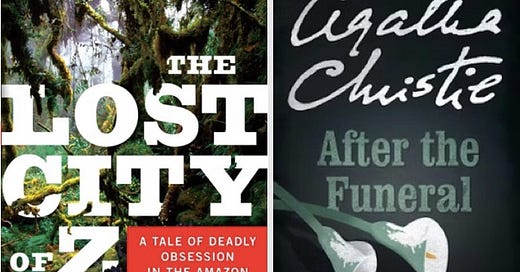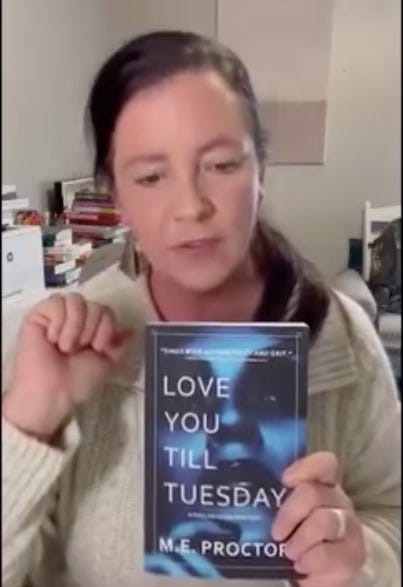The Merry Season threw a wrench in my writing gears. I haven’t been able to focus on work long enough to string sentences together in a meaningful manner.
Staring at a lifeless keyboard being a pointless activity, I turned to my to-be-read pile. Like a waistline after too many rich meals, it’s in serious need of trimming down. The results of my deep dive have been mixed. A couple of meh, not my vibe. Some okay, this is pleasant. And a few oh, that’s really good. As a rule, I never talk about the disappointments; the book that leaves me cold (or irritated) might be somebody’s favorite read.
So, here are two that I thoroughly enjoyed.
The first one is non-fiction, The Lost City of Z by David Grann, who also wrote the brilliant Killers of the Flower Moon. The subtitle—A tale of deadly obsession in the Amazon—is spot on. Grann recalls Percy Fawcett’s search for a vanished civilization in the heart of the Mato Grosso’s Green Hell in 1925. Fawcett disappeared, his fate a mystery, his obsession lethally contagious. It is estimated that at least a hundred explorers died, trying to find out what happened to him, and people are still trying. Grann also caught the bug. And talking about bugs … creepy crawlies, slithering killers, tiny fish with hooks that get into … ahem … this isn’t a stroll in the park. Indiana Jones revisited by Werner Herzog on an acid trip (Aguirre, and the Manaus Opera House make an apparition). I highly recommend, if you have the stomach for it. The film with Charlie Hunnam (Jax in Sons of Anarchy) is very good but the book packs a heftier punch.
My other pick is Agatha Christie’s After the Funeral. Like millions of people, I read her novels as a kid. Good memories but slightly faded, musty, and dusty. When Christie’s work comes to mind today it’s with a layer of excess and camp (Kenneth Branagh’s films), or ironic distance verging on parody (Knives Out). Christie has been so imitated that her books can’t be approached with a fresh mind.
After the Funeral, that I’d never read before, was a surprising and welcome reset.
The book came out in 1953. Agatha was 63 years old and her big hits were behind her—Orient Express, Nile, Roger Ackroyd, And Then There Were None—even if she would release books for another twenty years. Her last, Postern of Fate, was published in 1973.
After the Funeral is a Poirot case but stands out in the series, both in structure and theme. The usual reveal at the end is satisfying, but wrapped up by the lead detective quickly, almost an afterthought. The whodunit is not Christie’s main interest here, characters and social commentary dominate. For the best.
Poirot is absent from the first third of the book and he’s not doing much investigating afterwards either. He even hires a detective firm to do the legwork. The chapter where Poirot and the firm’s owner, Mr. Goby, talk shop is my favorite:
“The very simple-minded have often the genius to commit an uncomplicated crime and then leave it alone. Let us hope that our murderer—if there is a murderer in this affair—is intelligent and superior and thoroughly pleased with himself and unable to resist painting the lily.”
I’m not the only one who thinks that the inability to let sleeping dogs lie is what brings criminals down. Mr. Goby also comments that his operatives have it easier than they used to. They can pretend to be government officials and get all the answers they need, no fuss, no muss.
“Government snooping is God’s gift to investigators and long may it continue!”
Shades of Big Brother? George Orwell’s 1984 was published in 1949.
The story takes place in the aftermath of WWII, and it looms over the narrative.
“It was the night I made that chocolate soufflé that Mr. Abernethie died. Six eggs I’d saved up for it. The dairyman he’s a friend of mine. Got hold of some cream too. Better not ask how.”
The comment must have rung a bell for contemporary readers. Did you know that WWII food rationing in the UK lasted until 1954?
Hercule Poirot’s cover story has historic relevance. He poses as an envoy from some bogus United Nations organization looking for suitable lodgings for European refugees who have lost everything in the conflict. It’s an eerie echo of the first Poirot book, The Mysterious Affair at Styles, where the Belgian detective was himself a refugee from the Great War. Christie wrote that one in 1916, when she was working as a nurse and came in contact with displaced persons.
Issues of class, gender, and money always peek between the lines of Christie’s stories but they’re front and center in this one. The war has upended society and there is no going back. An old butler is emblematic of a way of life that tries to hold on to what was before and can’t. The Victorian mansion will have to be sold because nobody can afford to keep it up, or pay the taxes. Women, who’ve been kept to the side, cut off from inheritances, labelled hysterical or bird-brained turn into successful business owners, know how to fix car engines, and pretty much keep everything going. While the girls know what they want and go for it, the male protagonists, with the exception of an elderly lawyer, a subdued Poirot, and a sympathetic inspector, get a thorough trashing.
Christie sinks her sharp fangs (I believe she always had them, but kept them politely out of sight) in the traditional order with a solid dose of black humor. And while she’s at it, she takes accurate aim at xenophobes, hypocrites, the creaky British caste system, and, for good measure, art critics.
Some called the book dark and pessimistic. I disagree. It’s the work of a writer who’s letting loose, and has nothing left to prove. A writer who’s clear-eyed and not inclined to compromise. The world was thrown into an ocean of flame, rose-colored glasses are out of fashion and keeping it cozy just won’t do.
It all makes for a damn good read …
Thank you
Thank you for reading this post, I’m looking forward to keeping you entertained in the new year. Cross fingers, I haven’t run out of topics yet!
Best Thriller Books gave me a wonderful present to close 2024. They chose Love You Till Tuesday as one of their top books of the year. I’m honored and grateful. Their reviewer, Teresa Brock, posted a short video that you can watch here: https://x.com/BestThrillBooks/status/1871212465381400656
Teresa says she has a crush on my detective, Declan Shaw. I like to hear that! You can buy the book here, on Amazon (but it’s in other places too), and if you post a rating or a review, you’ll make me very happy!






I thought the Z movie was very poignant, especially that ending! Have never read any Agatha Christie but "After the Funeral" looks like a great place to start - thanks, Martine!
Your eagle-eyed analysis of Christie’s novel has convinced me to at long last read her works. Why I haven’t yet makes me scratch my head with a self-abasing finger. Despite the muse’s fickle fleet feet you’ve managed to cogently write and delight me with this excellent post. I, too, am chasing the muse so the entire premise resonates with me. Damn good, Martine.